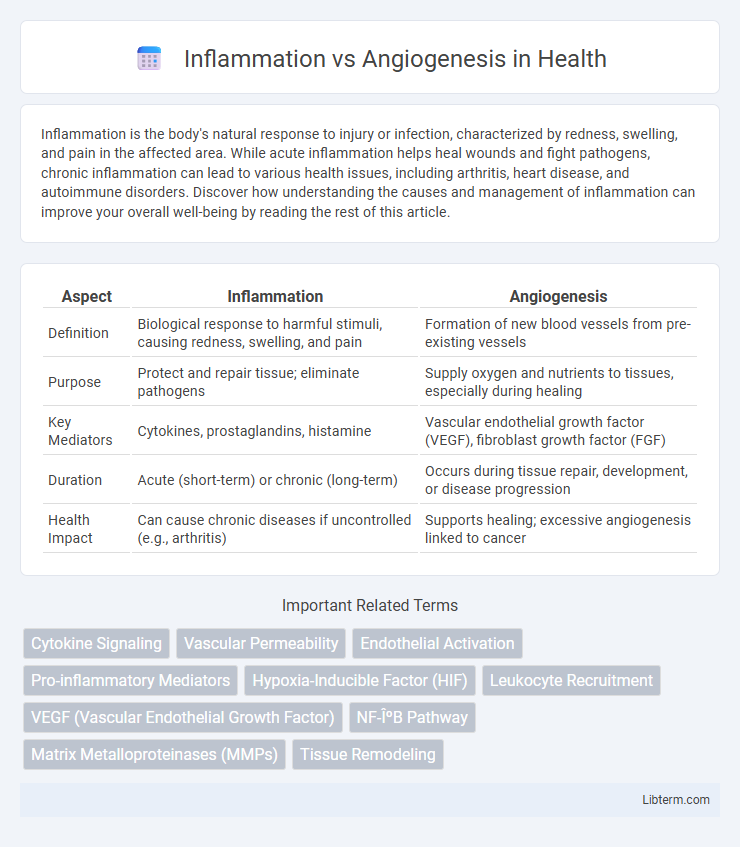Inflammation is the body's natural response to injury or infection, characterized by redness, swelling, and pain in the affected area. While acute inflammation helps heal wounds and fight pathogens, chronic inflammation can lead to various health issues, including arthritis, heart disease, and autoimmune disorders. Discover how understanding the causes and management of inflammation can improve your overall well-being by reading the rest of this article.
Table of Comparison
| Aspect | Inflammation | Angiogenesis |
|---|---|---|
| Definition | Biological response to harmful stimuli, causing redness, swelling, and pain | Formation of new blood vessels from pre-existing vessels |
| Purpose | Protect and repair tissue; eliminate pathogens | Supply oxygen and nutrients to tissues, especially during healing |
| Key Mediators | Cytokines, prostaglandins, histamine | Vascular endothelial growth factor (VEGF), fibroblast growth factor (FGF) |
| Duration | Acute (short-term) or chronic (long-term) | Occurs during tissue repair, development, or disease progression |
| Health Impact | Can cause chronic diseases if uncontrolled (e.g., arthritis) | Supports healing; excessive angiogenesis linked to cancer |
Understanding Inflammation: Definition and Mechanisms
Inflammation is a complex biological response to harmful stimuli, such as pathogens, damaged cells, or irritants, characterized by the activation of immune cells and the release of pro-inflammatory cytokines like TNF-alpha and IL-6. This process involves vascular changes including increased permeability and leukocyte extravasation, aiming to eliminate the initial cause of cell injury and initiate tissue repair. Understanding the molecular pathways, such as the NF-kB signaling cascade, is critical for comprehending how inflammation promotes or inhibits tissue homeostasis and interacts with angiogenesis during healing and disease progression.
The Basics of Angiogenesis: Formation of New Blood Vessels
Angiogenesis is the physiological process involving the growth of new blood vessels from pre-existing ones, crucial for tissue repair and wound healing. It is regulated by signaling molecules such as vascular endothelial growth factor (VEGF) and fibroblast growth factor (FGF), which stimulate endothelial cell proliferation and migration. This process contrasts with inflammation, which primarily involves immune cell activation and cytokine release to combat pathogens and initiate tissue defense.
Key Cellular Players in Inflammation
Key cellular players in inflammation include macrophages, neutrophils, and dendritic cells, which initiate and sustain the inflammatory response through cytokine release and phagocytosis. These immune cells interact with endothelial cells that regulate angiogenesis by promoting new blood vessel formation to supply oxygen and nutrients to inflamed tissues. Understanding the crosstalk between inflammatory cells and angiogenic pathways is crucial for developing targeted therapies in chronic inflammatory diseases and cancer.
Major Factors Driving Angiogenesis
Major factors driving angiogenesis include vascular endothelial growth factor (VEGF), fibroblast growth factors (FGFs), and angiopoietins, which stimulate endothelial cell proliferation and migration. Inflammatory cytokines such as tumor necrosis factor-alpha (TNF-a) and interleukin-8 (IL-8) also promote angiogenesis by enhancing expression of pro-angiogenic molecules. Hypoxia-inducible factor-1 (HIF-1) acts as a key regulator by upregulating VEGF under low oxygen conditions, thus linking inflammation and angiogenesis pathways.
Molecular Pathways: Inflammation vs Angiogenesis
Inflammation involves molecular pathways such as NF-kB and MAPK signaling that regulate cytokine production and immune cell activation, driving tissue response to injury and infection. Angiogenesis is primarily governed by VEGF and Notch signaling pathways, which promote endothelial cell proliferation, migration, and new blood vessel formation. Both processes share overlapping regulators like hypoxia-inducible factors (HIFs) but activate distinct downstream effectors to fulfill their biological roles.
How Inflammation Triggers Angiogenesis
Inflammation triggers angiogenesis through the release of pro-inflammatory cytokines such as tumor necrosis factor-alpha (TNF-a), interleukin-1 beta (IL-1b), and vascular endothelial growth factor (VEGF) that stimulate endothelial cell proliferation and new blood vessel formation. Immune cells like macrophages and neutrophils infiltrate inflamed tissue and secrete growth factors that promote angiogenic signaling pathways, including the PI3K/Akt and MAPK cascades. This process facilitates tissue repair by increasing oxygen and nutrient supply but can also contribute to chronic inflammation and pathological angiogenesis in diseases like cancer and arthritis.
Clinical Implications: Inflammation and Angiogenesis in Disease
Inflammation drives the release of pro-angiogenic factors such as VEGF, promoting new blood vessel formation that supports tissue repair but also facilitates tumor growth and chronic disease progression. Pathological angiogenesis in inflammatory conditions like rheumatoid arthritis and diabetic retinopathy exacerbates tissue damage and impairs healing. Targeting the interplay between inflammation and angiogenesis offers promising therapeutic strategies to control malignancies, autoimmune disorders, and ischemic diseases.
Inflammation vs Angiogenesis: Therapeutic Targets
Inflammation and angiogenesis are interconnected processes influencing various pathological conditions, making them critical therapeutic targets in diseases like cancer, chronic wounds, and autoimmune disorders. Targeting inflammatory pathways, including cytokines such as TNF-a and IL-6, can modulate immune responses and reduce pathological angiogenesis driven by factors like VEGF. Therapies combining anti-inflammatory agents with angiogenesis inhibitors offer promising strategies to disrupt disease progression by simultaneously controlling vascular growth and immune-mediated tissue damage.
Diagnostic Approaches for Inflammation and Angiogenesis
Diagnostic approaches for inflammation involve biomarker analysis such as C-reactive protein (CRP) levels, erythrocyte sedimentation rate (ESR), and imaging techniques including MRI and ultrasound to detect tissue swelling and immune cell infiltration. Angiogenesis is primarily assessed using molecular imaging methods like dynamic contrast-enhanced MRI and positron emission tomography (PET) targeting vascular endothelial growth factor (VEGF) expression and microvessel density. Advanced techniques including immunohistochemistry and circulating endothelial cell quantification provide precise evaluation of neovascularization in pathological conditions.
Future Perspectives: Research and Innovations
Future research on inflammation and angiogenesis is exploring targeted therapies that precisely modulate vascular growth and immune responses to treat chronic diseases and cancer. Advances in molecular imaging and biomarker identification enable real-time monitoring of angiogenic and inflammatory processes, improving personalized treatment strategies. Innovations in gene editing and nanomedicine hold promise for developing novel interventions that simultaneously control inflammation and pathological angiogenesis, enhancing therapeutic efficacy and minimizing side effects.
Inflammation Infographic

 libterm.com
libterm.com